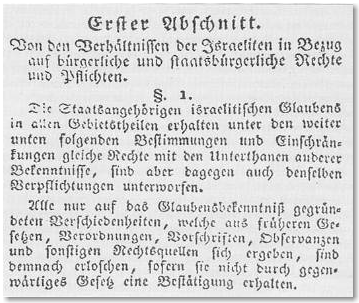On March 28, 1831, Carl Dellevie filed an application with the Rotenburg municipality for a scholarship
during his studies in Marburg. In reference to the purpose of the foundation Pastor Gutberlet, the chief
pastor of the so-called Altstadt pointed out in his recommendation of April 18, 1831 to Rotenburg's
town council that it was impossible for the municipal scholarship to be granted to a Jew "if it was
intended to be only for Christian students of theology." And so a glaring disparity perpetuated the
gaping chasm between legal equality in principle and its actual implementation in specific life situations.
After further "advisory opinions," the responsible committee in Rotenburg, managed by Pastors
Gutberlet and Hucke, came to the conclusion on June 2, 1831 that in its view "the municipal
scholarship is not available to Carl Dellevie." Without any municipal scholarship, Carl Dellevie
nevertheless began his university studies. He studied medicine in Marburg from the spring of 1831 until
the fall of 1834, and received his M.D. degree there in March 1835. After state examinations in
pharmacology and obstetrics, he applied to the Higher Medical Council on December 19, 1836 for a
license as a general practitioner in Hersfeld.
In Hersfeld, however, his request was not received enthusiastically. In their response to the request of
the Electoral government of January 29, 1837, the district administrator [Landrat] of Hersfeld and the
district doctor Dr. Zins expressed the concern that an additional – fourth – doctor would represent for
the [already] resident doctors an unacceptable diminuition of their income, since they could hardly earn
a living as it was. They enumerated very carefully how many doctors were appropriate to have in and
around Hersfeld, and explained that there were far too few patients and as a result no additional doctor
was needed.
However, the district doctor then forcefully took all this one step further: when he sees – viewed
"impartially" – how the doctors who have already established themselves locally are in such great
anxiety, because the applicant is the "son of an Israelite, whose father will most likely not refrain from
providing his son with customers in any way he can." In this way Carl Dellevie experienced for the
second time within just a few years the discrepancy between constitutionally guaranteed equality and
daily reality.
Some additional correspondence was exchanged between Carl Dellevie, the government, and the
Higher Medical Council [Obermedizinischen Kollegium] in Kassel, and then Carl Dellevie indeed
received, on March 28, 1837, permission to establish himself as a doctor in Hersfeld. The Minister of
the Interior informed him that according to the highest ruling of his Highness [the Elector of Kurhesse],
a medical practice and residence in Hersfeld had thereby graciously been granted to him.
According to the new
Kurhessian law of October
1833
"the citizens of Israelite
[Jewish] faith had the same
rights as subjects of other
creeds."
Source: Abbes, Hersfelds jüdische Geschichte, Bad Hersfeld 2002, p.52f.









